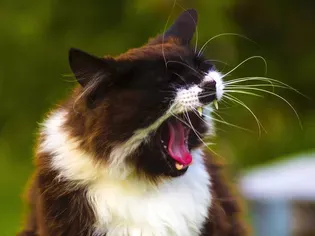Why Is My Cat Sneezing?
Updated on 05/27/24

Why Is My Cat Sneezing? A Comprehensive Guide to Understanding Your Cat's Respiratory Woes
Cats, those enigmatic and adorable creatures, are prone to a variety of ailments, one of the most common being sneezing. While occasional sneezing is a normal part of a cat's life, persistent or excessive sneezing can signal an underlying health issue that requires attention. This comprehensive blog post delves into the numerous causes of sneezing in cats, providing valuable insights to help you understand your feline companion's respiratory woes.
Upper Respiratory Infections: A Common Culprit
Upper respiratory infections (URIs) are the most prevalent cause of sneezing in cats. These infections are caused by viruses or bacteria, and they affect the nose, throat, and sinuses. Symptoms of a URI include:
* Sneezing
* Nasal discharge (clear, yellow, or green)
* Congestion
* Difficulty breathing
* Lethargy
* Loss of appetite
Allergens and Irritants: Triggers for Sneezing
Just like humans, cats can develop allergies to various substances, such as pollen, dust, smoke, and certain chemicals. When a cat encounters an allergen, its immune system overreacts, causing inflammation and sneezing. Irritants, such as strong odors or smoke, can also trigger sneezing.
Dental Disease: A Hidden Source of Sneezing
Dental disease, such as gingivitis or periodontitis, can lead to sneezing in cats. As bacteria accumulate in the mouth, they can cause inflammation and pain, which can extend to the nasal passages, resulting in sneezing.
Foreign Bodies: Obstacles in the Nasal Passages
Occasionally, sneezing in cats can be caused by foreign bodies lodged in the nasal passages. These objects, such as grass blades or small toys, can irritate the nasal lining and trigger sneezing.
Other Medical Conditions: Underlying Causes of Sneezing
In some cases, sneezing in cats can be a symptom of underlying medical conditions, such as:
* Feline herpesvirus (FHV-1): A common virus that can cause chronic sneezing and other respiratory symptoms.
* Feline calicivirus (FCV): Another common virus that can lead to sneezing, oral ulcers, and other symptoms.
* Fungal infections: Certain fungal infections, such as aspergillosis, can cause sneezing and respiratory distress.
* Chronic sinusitis: Inflammation of the sinuses can result in persistent sneezing and nasal discharge.
* Nasal polyps: Growths in the nasal passages can obstruct airflow and cause sneezing.
When to Seek Veterinary Attention
While occasional sneezing is usually not a cause for concern, it is important to seek veterinary attention if your cat exhibits the following symptoms:
* Persistent or excessive sneezing
* Nasal discharge that is thick, discolored, or bloody
* Difficulty breathing
* Lethargy
* Loss of appetite
Diagnosis and Treatment: Finding the Root Cause
Diagnosing the cause of sneezing in cats involves a thorough physical examination, including an examination of the nose and mouth. The veterinarian may also recommend diagnostic tests, such as bloodwork, X-rays, or fungal cultures, to determine the underlying cause.
Treatment for sneezing in cats depends on the underlying cause. For URIs, antibiotics or antiviral medications may be prescribed. For allergies, avoiding the allergen or using antihistamines can provide relief. Dental disease may require dental cleaning or extractions. Foreign bodies may need to be removed surgically.
Prevention: Proactive Measures for a Healthy Respiratory System
While not all causes of sneezing in cats can be prevented, there are steps you can take to reduce the risk:
* Keep your cat up-to-date on vaccinations to protect against common respiratory viruses.
* Provide a clean and allergen-free environment for your cat.
* Brush your cat's teeth regularly to prevent dental disease.
* Avoid exposing your cat to smoke or other irritants.
* Regular veterinary checkups can help detect and treat underlying medical conditions early on.
Conclusion
Sneezing in cats can be a sign of various underlying health issues, ranging from mild irritations to serious medical conditions. By understanding the different causes of sneezing and seeking veterinary attention when necessary, you can ensure that your feline companion receives the appropriate treatment and enjoys a healthy respiratory system. Remember, a healthy cat is a happy cat, and a cat free from respiratory ailments is one step closer to a long and fulfilling life.
Explore More Pets

Cat Behavior Problems
How to Stop Aggression in Kittens

Long-Haired Cat Breeds
Siberian Cat: Breed Profile, Characteristics, & Care

Cat Behavior Problems
How to Stop Kittens From Scratching and Biting

Long-Haired Cat Breeds
Turkish Angora: Cat Breed Profile, Characteristics & Care

Basic Training
How to Socialize Your Kitten

Short-Haired Cat Breeds
Cute Pictures & Facts About Calico Cats & Kittens

Litter Box Training
Training Your Kitten to Use the Litter Box

Long-Haired Cat Breeds
10 Fun Facts About White Cats
